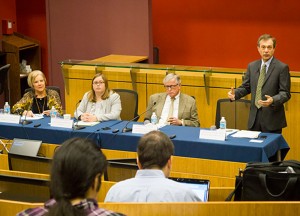
A panel of three experts in the healthcare field gathered Nov. 6 in the Thomas R. Kline School of Law to discuss “Obamacare After the Election: Apocalypse or Resurrection” with about 25 students and professors, who were scattered comfortably in the lecture room. Public health-care law played an important role in the midterm Congressional elections, especially, after both the House and the Senate gained a substantial Republican majority.
These panelists were recruited by professor of law and health care management policy Robert Field to discuss the future of the Affordable Care Act (Obamacare) now that the Republicans have taken the House and the Senate.
“The question is what’s likely to happen — what are the Republicans likely to do in the new congress?” Field asked while mediating the discussion.
Mark Pauly, who sat behind a name card that read “What would the Republicans do?” was the first to offer insight on three aspects of the act that Republicans would like to see gone.
“The sense that the government can only get things done by raising taxes or increasing control of the economy or interfering in peoples’ lives is something that Republicans don’t accept,” Pauly said. He went on to say that he identified more with the Republican party because as an economist he was in strong favor of market reforms.
“[President Barack Obama] has said he’d be interested in modifications as long as they don’t go to the core of the legislations. The most obvious ones are some of the taxes, particularly the medical device tax,” Pauly continued.
He elaborated that this tax, which is levied , does not actually raise much money and is one that the Democrats have even expressed skepticism about.
“The second thing they would like to get rid of is the employer mandate. It’s a mandate for firms to provide coverage to their full time workers,” Pauly explained, “The third one is individual mandate — people have to buy health insurance even when they don’t want to.”
As the director of the Pennsylvania Health Access Network and fellow panelist, Antoinette Kraus helps such people without healthcare find affordable providers.
She spoke on what the midterms brought to Pennsylvania’s healthcare reform in the area of Medicaid with the election of
“What’s going to happen in Pennsylvania now that we’ve got Governor-elect Wolf?” Kraus asked, “Well, we’ve seen the Wolf administration make comments that they are for a full Medicaid expansion.” She went on to say that if Wolf moves quickly, the national legislature shouldn’t intervene since the initiative has already been approved.
Healthcare consultant Paula Stillman, the third panelist, chimed in that although she had been unable to find much information about Wolf’s position on health care reform, she understood several factors of it. “The main points are that he supports freedom of choice for women, he would like to expand the state Medicaid plan and he’d like Pennsylvania to develop its own state exchange rather than using federal exchange.”
Mediator Field then brought up the issue of public health, which has become a major issue within the last year due to the Ebola outbreak. “It was kind of an implicit issue in the election with just the sense that the [Centers for Disease Control and Prevention are] not doing what it should be doing. Is public health now more on the national consciousness? Is this going to be more of a political debate going forward?” he asked the panelists.
“I think access is only one piece of the public health puzzle,” Kraus spoke addressing the fact that mandating health care would not solve the public health problem, “I think what we’re seeing is just because people have health insurance coverage that doesn’t make them necessarily healthier. It’s educating folks about the importance of going to your primary care doctor.”
“We actually followed up with about three hundred folks that we enrolled last year and in July, 60 percent of folks had still not visited their primary care physician or even thought about choosing one,” Kraus continued.
“I don’t think the Affordable Care Act will [repealed], but I think the thing we have to concentrate on now is improving access to care, quality of that care and figuring out how to measure outcomes of that care,” Stillman chimed in.
Field’s final question of the night was if the panelists saw healthcare and the ACA being a national issue in the upcoming 2016 elections.
“If we look at the percentage of the gross national product health care has to be an issue because healthcare consumes,” Stillman said, “and there are many indications that the quality is not that high so we’re paying for health care that might not be optimal so it’s got to be a political issue. In order to make meaningful change in the way people get healthcare, we have to follow the money and look at who determines the costs. It could be the patient, it could be the primary health care physician [or] it could be the health system.”
Evan Gooberman, a second-year master of public health student, attended the panel because the topics discussed pertain to his future career.
“I think the most pressing issue here is the continued polarization between the two parties and the lack of ability to not just compromise but to work together,” Gooberman said, “Healthcare is a huge issue because like they were saying at the end everyone needs healthcare at some point — multiple points during their lives and for our country to be so divided and not be able to come to conclusions about it is very troubling.”
The three panelists currently work for The Field Clinic, a blog that Field runs. Further predictions and stipulations of theirs can be found at http://www.philly.com/philly/blogs/fieldclinic/

